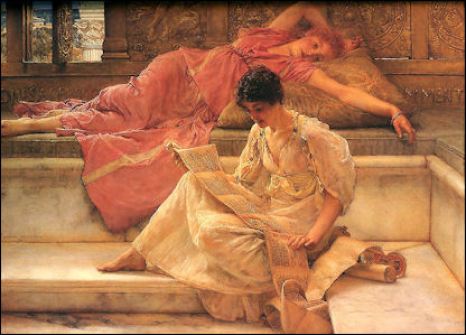Pliny (Epistula 1.9) discusses the distress of urban business, and the delight of study in a country retreat:
It is marvelous how on individual days, you can account for your time (or at least, you seem to be able to), but when many days are joined together, the account does not add up. For, if you were to ask someone, ‘What did you do today?’ he would respond, ‘I was there for the ceremony of the toga virilis, I went to an engagement or a wedding, this one guy needed me to sign a document, this other guy needed my legal assistance, and a third man asked for my counsel.’ Now, these things all seem necessary on the day during which you do them, but when you look back and consider that you have done them every day, they seem totally inane, especially once you retire from the city.
Then the thought comes upon you: ‘How many days I have wasted in such cold business!’ This happens to me when I retire to my villa in Laurentum to read, write, or even give a rest to my body, by whose support the spirit is held up. There, I neither hear nor see anything which I would regret hearing or seeing; no one slanders someone else with malicious talk in my presence, and I myself need not reproach anyone, except perhaps myself when I write poorly. I am made anxious by no hopes or fears, and am disquieted by no rumors: I speak only with myself and my books. O, what an upright and pure life! O, sweet, honest leisure, perhaps more beautiful than any business! O sea, o shore, o you true and secluded home of the Muses, how many things you discover, how many things you say! Accordingly you too should abandon that noisy bustle, that vain running-about and those exceptionally unsuitable labors, and as soon as you get the chance, you should give yourself to study or leisure. As our own Atilius said in that most erudite and charming way of his, it is more satisfying to be at leisure than to do nothing. Farewell!

Plinius Minicio Fundano suo s.
Mirum est quam singulis diebus in urbe ratio aut constet aut constare videatur, pluribus iunctisque non constet. [2] Nam si quem interroges ‘Hodie quid egisti?’, respondeat: ‘Officio togae virilis interfui, sponsalia aut nuptias frequentavi, ille me ad signandum testamentum, ille in advocationem, ille in consilium rogavit.’ [3] Haec quo die feceris, necessaria, eadem, si cotidie fecisse te reputes, inania videntur, multo magis cum secesseris. Tunc enim subit recordatio: ‘Quot dies quam frigidis rebus absumpsi!’ [4] Quod evenit mihi, postquam in Laurentino meo aut lego aliquid aut scribo aut etiam corpori vaco, cuius fulturis animus sustinetur. [5] Nihil audio quod audisse, nihil dico quod dixisse paeniteat; nemo apud me quemquam sinistris sermonibus carpit, neminem ipse reprehendo, nisi tamen me cum parum commode scribo; nulla spe nullo timore sollicitor, nullis rumoribus inquietor: mecum tantum et cum libellis loquor. [6] O rectam sinceramque vitam! O dulce otium honestumque ac paene omni negotio pulchrius! O mare, o litus, verum secretumque μουσεῖον, quam multa invenitis, quam multa dictatis! [7] Proinde tu quoque strepitum istum inanemque discursum et multum ineptos labores, ut primum fuerit occasio, relinque teque studiis vel otio trade. [8] Satius est enim, ut Atilius noster eruditissime simul et facetissime dixit, otiosum esse quam nihil agere. Vale.

“I am made anxious by no hopes or fears…” Ha! If only academic summers were actually like this.
Indeed! If only ANYTHING at all were actually like that!
repost this!